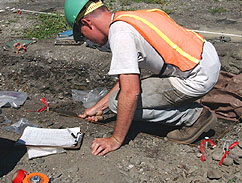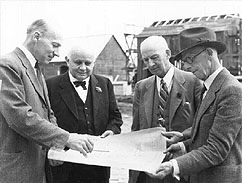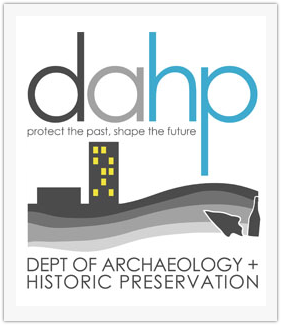Hiring a Preservation Consultant
 Why Should I Hire a Historic Preservation Professional?
Why Should I Hire a Historic Preservation Professional?
Hiring an appropriate and qualified historic preservation professional will improve the quality of your project, save you time and money, and will help you protect the history of your property. Note that there are professional archaeologists, historians and preservation architects who have specific educational and project experience to guide your preservation project. These various professionals often work as a team with you to help guide your project planning and implementation. The following text is designed to help you find and hire a preservation professional that is best suited to your project.
What Services do Historic Preservation Professionals Provide?
Different types of historic preservation professionals, also referred to as cultural resource professionals, can assist your preservation project in different ways. There are three main types: Archaeologists, Historic Preservation Consultants, and Preservation Architects. Archaeologists find and evaluate the remains of past cultures buried in the ground. Their work often includes a visual survey of the land to locate sites, subsurface testing, and careful excavation to find information for analysis.
Historic Preservation Consultants/Architectural Historians study our built environment. They consider the historical and architectural importance of buildings constructed more than 50 years ago, and provide historical research, documentation, plus analysis and recommendations based on their findings.
Preservation Architects prepare plans for appropriate work on historic buildings, and direct the work to preserve important features and avoid damage. This work can include restoring a building to its original appearance or rehabilitating it to serve a new use while keeping its historic integrity. Preservation architects also help plan the efficient use of building space, and can generate drawings of a historic building to use in rehabilitation.
Note that there are other types of professionals who are sometimes involved in preservation projects depending on the complexity of the undertaking. These may include an anthropologist, preservation planner, landscape architect, engineer or other preservation professional.
Who is a Qualified Professional?
To work on any projects which have a federal nexus, preservation professionals must have a combination of education in a closely related field of study plus the right work experience to be qualified to work on historic preservation projects. Qualification standards listed in the federal publication Archaeology and Historic Preservation: Secretary of the Interior's Standards and Guidelines and establish levels of education and work experience appropriate for each profession. For additional info click here!
How do I Select Profesionals Best Suited to My Project?
The DAHP does not license, certify, or recommend historic preservation or cultural resource professionals. However, DAHP often refers clients searching for qualified professionals to two on-line directories based in Washington state:
- The Association for Washington Archaeology (AWA) list of qualified archaeologists can be found on the organization’s website; and
- The Washington Trust for Historic Preservation has developed a Preservation Trades & Consultants Directory which can guide you in finding a consultant from a wide range of preservation related fields such as archaeology, architecture, landscape architecture, photography, and others. However, be aware that the contractors listed have paid to be included in the directory and none of the firms listed have been vetted by DAHP as meeting professional standards.
- Historic Seattle maintains as list contractors, consultants, designers, builders, and vendors have experience with residential and commercial renovation, restoration, maintenance, and landscape projects. This directory is provided as a resource to those seeking preservation services. Inclusion in this directory does not imply recommendation or endorsement by Historic Seattle or Washington State.
- Oregon DOT maintains a list of qualified cultural resources consultants whom have completed required training. These indiviuals are certified to provide cultural resource documentation for ODOT's Statewide Transportation Improvement Projects or other projects using federal funding (including one here in WA State).
In using these lists, it is important to note the disclaimers clearly stating that listing in the directories is not an endorsement or recommendation of the professionals, nor can the directory’s host be held responsible for any of their work.
The following general suggestions may help you find the professional best suited to help with your project.
1. Identify preservation professionals - Develop a list of at least three preservation professionals or firms to consider for selection.
2. Examine qualifications - Contact the firms on your list and describe the project. Ask if the firm is available and has relevant experience in historic preservation. Invite each firm you contact to send information concerning their experience, qualifications, and personnel
3. Interview the best prospects - Select three to five firms to interview - Some preservation professionals charge for interviews; ask if there is a fee. Remember that a preservation professional cannot afford to spend much time talking about a project before being hired. However, any preservation professional who is interested in working with you will spend some time presenting their qualifications and discussing your project.
To allow you to compare the different firms you interview, try to provide each firm with a clear idea about the work you want to do, a general budget, scheduling and other issues that will affect the work you propose. Allow at least one hour for the interview. Ask to see samples of work similar to your project. Ask how busy the firm is, and who would handle your project. Be sure to meet the person who would directly manage your project. This person should be a qualified preservation professional.
Ask for references on similar projects and check them. Ask those referenced if they were completely satisfied with the work, and if the project was done in a timely manner.
4. Hiring a Preservation Professional - Tell each firm you interview what you plan to do next and when you plan to make your decision. Notify the selected firm as soon as possible. Base your decision on your confidence in the firm, comments from references, the firm's preservation knowledge, technical competence and professional services. Develop and sign a contract that clearly defines the scope of work, necessary services and applicable fees before starting any work.
General guidance for selecting a preservation professional:
- Talk directly with the professional about your project
- Check for professional experience with projects similar to yours
- Review examples of completed work
- Check references very carefully; ask questions about the acceptability and timeliness of the work performed.
Archaeologists
Archaeological sites and burials are protected from unauthorized excavation and alteration on both public and private lands in Washington State. Permits are required from DAHP for work on an archaeological site. Click here for more information on the legal protections of archaeological sites.
Because of this, it is imperative that your archaeological consultant be well-versed in the legal requirements, protections and treatments of archaeological sites, as well as current scientific research, so they can appropriately advise you and see that your project is completed in compliance with state statutes.
 Many environmental and engineering firms, private consulting firms, Tribal Cultural Resources offices, and university programs have archaeologists on staff who specialize in doing work that meets state and federal regulations.
Many environmental and engineering firms, private consulting firms, Tribal Cultural Resources offices, and university programs have archaeologists on staff who specialize in doing work that meets state and federal regulations.
DAHP does not keep a list of professional archaeologists. However, we offer you the following information to obtain when speaking to a potential archaeological contractor in order to select the archaeologist most suited to your project:
- Obtain the AWA Contractors List from the Association for Washington Archaeology’s website.
- Find professionals with experience in your region
- Get bids/estimates
- Check references and review work examples
- Ask them about their experience and expertise in working with the state archaeological and burial laws
- Ask what their compliance rate on DAHP Excavation and Site Alteration Permits is
- Ask DAHP if the archaeologist is compliant with their DAHP Excavation and Site Alteration Permits
- Ask the archaeologist if he/she has experience working with the with the affected Tribes in your area.
Historic Preservation Consultants, Architectural Historians, Historians and Related Professionals
Qualified historic preservation consultants, architectural historians, historians and/or professionals from closely related fields such as folklore, cultural geography, museum studies or planning specialize in the evaluation of built environment (above ground) resources. These preservation professionals can help you with historic preservation projects, Section 106 reviews, applications for historical designation, and long term preservation planning projects. In these situations it is important to hire a professional whom understands the built environment and architectural history. Be aware that some professionals who have considerable experience may not have direct experience with your type of project, so check first.
As a service to project sponsors, DAHP will refer you to property owners or communities who successfully completed similar projects. Other sources of information include local preservation commissions, academic institutions, professional organizations, and your neighbors with similar projects.
To select the historic preservation consultant, architectural historian, historian or related professional most suited to your project:
- Check to see if they meet proffesional standards and have specific knowledge in documenting the built environment.
- Contact property owners or communities with successful projects similar to yours. DAHP can assist you in finding who or where these are.
- Obtain resumes and additional references from the professionals involved in those projects
- Get bids
- Check references
- Review examples of completed work
- Ask DAHP staff if consultant has successfully completed built environment survey work
Preservation Architects
Historic buildings often have unique designs, materials and construction methods that may not be familiar to an architect who does not specialize in historic preservation. Preservation architects have training and experience working on historic buildings, and are often able to work more efficiently, sensitively, cost effectively and produce higher quality preservation projects. If your project involves work on a historic building or structure or is located within a historic district or landscape, it is also important to assess whether your prospective architect is familiar with the Secretary of the Interior’s Standards for Rehabilitation ("The Standards"). These Standards are comprised of ten common-sense principles that help define an appropriate approach to designing a preservation project. The Standards are widely referenced and applied in the historic preservation field. Making sure your preservation architect understands and has used the Standards should be an important factor in your selection process.
 To find a qualified preservation architect, contact your local American Institute of Architects (AIA) chapter. Also seek referrals from property owners in your area with projects similar to yours. Other preservation professionals, such as preservation planners, landscape architects and engineers may also be important to include on your project team, depending on the type of work needed. The architect you select will help to assemble appropriate professionals and qualified contractors for your project.
To find a qualified preservation architect, contact your local American Institute of Architects (AIA) chapter. Also seek referrals from property owners in your area with projects similar to yours. Other preservation professionals, such as preservation planners, landscape architects and engineers may also be important to include on your project team, depending on the type of work needed. The architect you select will help to assemble appropriate professionals and qualified contractors for your project.
During the interview process, ask to meet at the architect's office so you can see where the work will be done. Discuss possible services, scheduling requirements and the philosophy with which the architect would approach your project. Base your final decision on your confidence in the firm, comments from references, the firm's preservation design ability, technical competence and professional services. If a team approach will be used with other professionals, such as engineers and landscape architects, you should also examine samples of their past work. Once you select a firm you should have more detailed discussions about the project scope of work, budget and range of fees the architect anticipates. Fees can be stated in several different ways including a fixed fee, a percentage of the construction cost, time and materials (T&M) or some combination of these. Sign a contract before starting any work. The AIA has standard contract forms that are often used.
To select the best preservation architect for the job:
- Contact the AIA to ask for referrals - AIA Washington Council: (360) 943-6012
- Contact property owners or communities with successful projects similar to yours
- Ask about experience and success in using the Secretary of the Interior’s Standards for Rehabilitation
- Obtain resumes and other information on firms
- Interview firms and review examples of completed work
- Check references
- Check for honors and/or commendations in preservation preservation projects from organizations such as the AIA Washington Council Civic Design Awards, AIA Seattle Design Awards, or the State Historic Preservation Officer (SHPO) Awards.
- How to Seletect and Architect
- 20 Questions to Ask Your Architect
- You and Your Architect
Legal Considerations
Federal historic preservation laws require that qualified professionals be employed on historic preservation projects with a Federal nexus. Be aware that property owners and project sponsors have legal responsibilities when:
- A project involves federal funds, licenses, permits or approval;
- Project land is owned or controlled by a state agency; and
- A historical designation or covenant requires review of proposed work. The National Historic Preservation Act requires federal agencies to consult with the State Historic Preservation Officer (SHPO) to minimize damage to important historic and prehistoric properties whenever projects involve federal funds, licenses, permits or approval. In Washington State, the Executive Director of DAHP serves as the SHPO. Projects reviewed under the National Historic Preservation Act must be conducted by professionals who meet the qualification standards listed in the federal publication Archeology and Historic Preservation: Secretary of the Interior's Standards and Guidelines (Link).
For additional questions about hiring a presevation professional, plase feel free to contact the Department of Archaeology & Historic Preservation: (360) 586-3065




